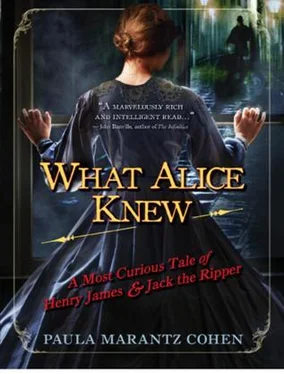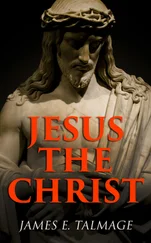However much one tried to take hold, it happened. One killed the poor woman again by describing her death. It was the fundamental paradox that one had to kill again and again in order to live. And the paradox went further when one thought about the killing itself. For one might say that Jack the Ripper’s escalating brutality was a means of confronting the reality of death rather than obscuring it with abstract notions or averted glances. Each murder required that he keep it from receding into the unreal, and each time, it required greater ingenuity, greater viciousness to do this. It made the murderer not just an artist, William thought bitterly, but a philosopher. A murderer was perhaps by definition an applied philosopher.
He could feel his mind moving in the direction he feared most: forgetting the distinctions that constituted life, forgetting the scale of things, making everything into some version of the same. Morality was predicated on distinction and scale. He must never forget that. To forget was the path to madness.
Henry had been working on his novel, practically without pause, all week. It was like that with him. Everything else was embroidery and diversion; writing was the center and foundation of his life. Bounded by a nutshell , he sometimes thought during these intensive, almost maniacal periods. He might get up for a cup of tea and a biscuit, but it was only to carry them back to his desk, too excited to stop working and eat properly. Now, for example, he sat, absently picking at the buttered crumpet that he had put down near his chair, contemplating the sentence that he had just written. We must recognize our particular form, the instrument that each of us—each of us who carries anything—carries in his being. Mastering this instrument, learning to play it in perfection, that’s what I call duty, what I call conduct, what I call success . Was he overdoing it? Perhaps he was, but the character who was speaking these words was flamboyant and extravagant, and the sentiments expressed were true.
After putting aside the idea of writing about murder and tabling his dramatization, he had decided to work on a story about art and theater, more congenial and familiar subjects. His heroine was an actress; his hero, a painter. Ellen Terry and Walter Sickert were not far from his mind; Wilde was in there; and his brother too was an oblique inspiration. He had glimpsed in William over the last few days a resurgence of the conflicted loyalties that had besieged him during his youth. He had watched with fascination as the struggle, muted by age and experience, replayed itself. He himself had never had such a struggle. After a brief and unpleasant dabbling in the law, he had plunged, with certainty, into his vocation as a writer. It had been simple for him. He could not do most things, and what he could do, he did. But William had always been capable of many things. The stress of choice had weighed on him.
In the novel Henry was working on, the hero would be like that—a man drawn to the artistic life who felt obligated to pursue a political career. With William, of course, the loyalties were different—more tangled and confused—but that was as it should be. One didn’t want art to imitate life. As deep as his characters were, they were never as deep as real people. To go that deep, one would drown.
He was engrossed in his work, scattering crumbs on the floor and spotting his notebook with butter, when a clamor was heard in the hallway, and Alice’s girl Sally pushed into the room.
“She wouldn’t wait to be announced, sir,” said Mrs. Smith, coming in behind huffily. Despite her own frequent lapses, she was always shocked by a lack of decorum in other people.
Sally, however, did not register Mrs. Smith’s protests. She had thrown off her usual timidity and, breathless and distraught, ran to Henry and pulled at his sleeve. “You must come at once,” she cried. “Your sister needs you.”
Henry required no more incentive than the girl’s frightened words. He rose hurriedly from his desk and followed her to the waiting carriage. As they drove the few blocks to the other end of Bolton Street, Sally could say only that Alice had been wild with fright, though the girl had no idea why.
It was only when they were in the carriage that he realized that it was nearly four p.m. and he had not seen William all day. Engrossed in his writing, he had lost track of time. Now it occurred to him to wonder where his brother was and why he had not heard from him. He told the driver to drive faster.
Alice had spent the morning listening to Katherine’s report on her sister: Louisa’s appetite was back, and she had put on weight, all the result of Katherine’s diligent care. Hadn’t she done the same many times for Alice—nursed her back to relative health from the brink of hypothetical death? That was Katherine’s genius after all, to make people make an effort and continue living their lives.
Generally, Alice was jealous when Katherine spoke about her sister, who was, though fragile, fortunately not as fragile as Alice. But today, she listened patiently. She was grateful to have Katherine back and was willing to indulge her more than usual. They had had a pleasant reunion the night before, dining together over a mutton stew that Sally had whipped up entirely on her own. The girl had begun to put ingredients together, a sign, they agreed, that she could think for herself. “Perhaps she will be a cook,” said Alice, “and Archie can be a footman.” They had laughed delightedly at the idea. Despite her reformist impulses, Alice agreed with Henry that the lower orders had no reason to aspire to the occupations and desires of the higher ones. Comfortable servitude seemed to her to have much to recommend it.
On the subject of Sickert, she had said little to Katherine except that her portrait was done, and the artist would deliver it in its frame in a few days.
“I look forward to it,” said Katherine shortly, and Alice was glad that she did not pursue the subject. Her relationship with Sickert seemed too private to discuss even with—indeed especially with—her most intimate companion.
After an early luncheon, Katherine left to do errands, and Alice turned over in her head what ought to be done with regard to the Ripper investigation. It was wearisome. They were going to have to start again, comb through the membership lists of the art societies, look through the exhibition catalogs, interrogate John Sargent about the gossip in the art world. She still believed that the murderer was an artist, but everything else they had assumed before now struck her as dubious. Convinced as she was of Sickert’s innocence, she could hardly say that the idea of a Whistler connection carried much weight. P of W —“pupil of Whistler.” It was, upon consideration, a silly hypothesis. The line between the letters might not be “of,” and PW could stand for anything.
She had been jotting some notes in her diary and dozing, when Archie came to the door with a package.
“This here been dropped off for you, milady,” he said, presenting it with the characteristic flourish that Alice found both amusing and pathetic. He would be less charming, she thought, when the novelty of his circumstances wore off, and yet she could only hope that they would, that he would forget that he ought to be grateful for regular meals and people who cared about him, that he would come in time to take such things for granted.
“Who left it?” she asked, looking curiously at the box on which her name was scrawled, not very tidily, in red ink.
“Don’ know that,” said Archie. “It was lyin’ on the mat when I went out to wash the stoop. I was out an hour afore to shake the rug, and it weren’t there then, so I’d say it were left within the hour.”
Читать дальше












